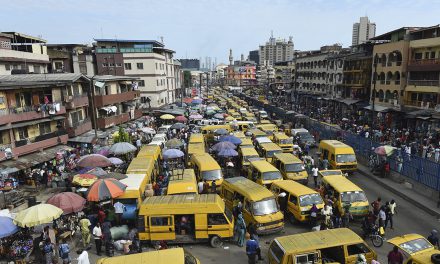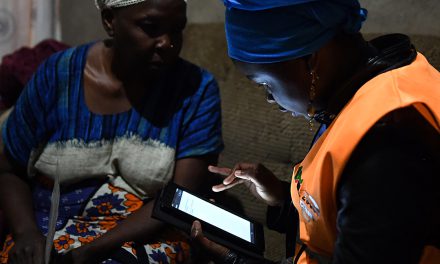The overall state of data collection in Zimbabwe remains mixed, with plenty of challenges in collecting the data the various sectors of the economy require.
For Zimbabwe, where nearly 80% of the population is rural-based, collecting both qualitative and quantitative data faces challenges, including low response rates; unreliable road access; unsuitable physical locations, including politicised locations; political and legal restrictions; and religious and cultural barriers. Researchers also need to contend with challenges that all researchers, in both the developed and developing world face, such as the need to ensure strong connections with people based in the local environments in which data collection takes place.

A man wearing a face mask waits in line outside one of the many Mukuru shops in Harare on March 23, 2022. Photo: Jekesai Njikizana/AFP
From an economic perspective, there are other challenges – inconsistent data collection standards, the context of data collection, where data collection is not core to business function, a lack of training in data collection as well as quality assurance processes – to name just a few.
That said, there has been a massive improvement in the collection and publication of some data, macro-economic data, for example. The Reserve Bank of Zimbabwe quarterly publishes data on the manufacturing sector, public finances, stock market indices, the exchange rate, prices and the real estate sector.
The World Bank annually produces a report on the various sectors of Zimbabwe’s economy, and the Confederation of Zimbabwe Industries, the mother body of the manufacturing sector, annually releases a report on the state of the sector in Zimbabwe. But the main agency with responsibility for data collection in Zimbabwe is ZimStat, the central statistical office, which is part of the Ministry of Finance.
Independent economist Eddie Cross, who is also the author of Zimbabwe’s president, Emmerson Mnangagwa’s, biography, told Africa in Fact that in the past ZimStat had been a very effective agency that “went downhill very badly during the collapse of the economy in the period leading up to 2008”.
“There has been some recovery, but ZimStat remains an agency operating well below the desired level. Generally speaking, the data collected by government is not regarded as being totally reliable,” Cross said.
Janet Zhou, executive director of the Zimbabwe Coalition on Debt and Development (ZIMCODD), agrees. She told Africa in Fact that ZimStat had to be continually strengthened to be able to carry out its mandate.
“In the past, we have seen donors and cooperating partners providing funds to ZimStat to enable it to fulfil its mandate, but I think the government should – and can – do more to capacitate ZimStat in order to provide the required data in a timely and comprehensive manner,” Zhou said.
ZimStat has, in the past, received support from the Australian Agency for International Development, the Danish International Development Agency, the United Kingdom Department for International Development, the European Union, the Swedish International Development Agency, and the United Nations Development Programme, among others. Funding agencies contribute 30% of ZimStat’s needs, especially during a census period.
“[But] for us to be convinced that government is committed to data collection it will require investment in resources to institutions, such as ZimStat, that collect and analyse data,” Zhu said. She also pointed out that toxic politics and propaganda inhibited the collection and release of some specific data, and this was especially true in rural areas where political figureheads first had to be consulted before one could access information.
“As such, there is limited data collection in Zimbabwe. All stakeholders rely heavily on foreign research, for example from the IMF, World Bank, AfDB, and OECD,” she added.
In the private sector, Zhou said, data collection, particularly primary data, was costly. “Economic instability affects the ability of the private sector to collect data, and, in any event, there are few private research firms in Zimbabwe to collect and maintain updated databases.”
Economist Prosper Chitambara told Africa in Fact that data was critical if government was going to create effective policies, arguing the extent to which credible and timely data was available to government determined the effectiveness of government policies.
“For example, there is a need for more data collection on the informal economy because Zimbabwe’s economy is now largely informal,” Chitambara said, “and a lot of activities are now underground.”
Zimbabwe’s informal sector employs 85% of the workforce and contributes about 40% to the country’s GDP. The contraction in the Zimbabwe economy has forced government to introduce presumptive taxes on the informal sector, in a bid to capture revenue from this growing economic sector. But the implementation of presumptive taxes has induced changes in behaviour among those in the informal sector in their attempts to evade these taxes, resulting in economic inefficiency.
“We need to have a clearer understanding of the informal economy and its dynamics,” Chitambara said. “If government is to come up with relevant policies to address issues of the informal economy, then it must have data to inform its response to, for example, the high levels of informality.”
But informal economies, defined as economic activity not included in a nation’s data on gross domestic product, and not subject to formal contracts, licensing, and taxation, are difficult to measure.
In March this year, officially marking the 50-day countdown to Zimbabwe’s 2022 national census scheduled to be held in April, President Mnangagwa said the government recognised the importance of data gathering and was ready to address gaps in services and facilities that the census would reveal.
“Zimbabwe’s economic growth and development requires full and optimal utilisation of the existing labour force,” Mnangagwa said. “Through the upcoming census, ZimStat will provide relevant, accurate and reliable statistics on the size, composition and skills of our labour force.”
But ZIMCODD believes the government’s attitude to data collection is inconsistent. “Census surveys are taken lightly because enumerators are not well paid and there is inadequate monitoring,” Zhou said. “There is also poor record-keeping, in the mining sector, for example, culminating in double allocations which the cadastre system was introduced to rectify.”
Both Zhou and Chitambara agreed that open data systems were critical in enhancing transparency and accountability – and in furthering good governance overall. Both noted that several countries in the region, including South Africa, had migrated to open data systems as a way of strengthening transparency and accountability.
Chitambara said that as long as data was unavailable it was difficult to hold government to account. Zhou, meanwhile, added that open data systems made public expenditure tracking easy and promoted the optimum efficiency of the public sector through inter-operability between public institutions.
“Generally, public sector systems lag behind in their response time,” she said. “But with open data, they could track and predict changes in real-time and respond accordingly to the changes happening. It would allow the public sector to streamline its processes and services; it would [also] be possible to pinpoint areas of improvement and enhance productivity in a measurable way.”
As Cross reiterated: “Without good data it is impossible to manage an institution as complex as government and all its associated agencies.”
[activecampaign form=1]
Barnabas Thondhlana has worked for Dow Jones and Bloomberg newswires as their Zimbabwe correspondent. He is the publisher of three community newspapers and a national daily, and a media trainer in investigative journalism. He has been instrumental in the formation of several independent newspapers, including the Zimbabwe Independent, The Daily News, The Daily News on Sunday, Newsday and The Observer.












